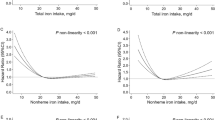Abstract
Objective
To prospectively examine the associations between zinc intake, the zinc to heme iron ratio and the incidence of hyperglycemia in Chinese.
Methods
We followed 1056 healthy adults aged 20 and older from 2002 to 2007. Dietary data were collected using 3-day food record and food frequency questionnaire. Hyperglycemia was defined as fasting plasma glucose >5.6 mmol/l.
Results
During the 5 years of follow-up, we documented 125 incident cases of hyperglycemia. Zinc intake alone was not associated with the risk of hyperglycemia. The zinc to heme iron ratio was inversely associated with the risk of hyperglycemia: odds ratios (OR, 95% CI) across increasing quartiles of the zinc to heme iron ratio were 1.00, 0.78(0.44–1.37), 0.40(0.19–0.83), and 0.21(0.08–0.54)(p for trend= 0.001). Adjustment for lifestyle covariates did not significantly change the associations.
Conclusions
This cohort study suggests that the zinc to heme iron intake ratio was significantly associated with a decreased risk of hyperglycemia in Chinese adults.
Similar content being viewed by others
References
Vallee BL, Falchuk KH. The biochemical basis of zinc physiology. Physiol Rev 1993;73:79–118.
Haase H, Overbeck S, Rink L. Zinc supplementation for the treatment or prevention of disease: current status and future perspectives. Exp Gerontol 2008;43:394–408.
Faure P, Barclay D, Joyeux-Faure M, Halimi S. Comparison of the effects of zinc alone and zinc associated with selenium and vitamin E on insulin sensitivity and oxidative stress in high-fructose-fed rats. J Trace Elem Med Biol 2007;21:113–119.
Haase H, Maret W. Protein tyrosine phosphatases as targets of the combined insulinomimetic effects of zinc and oxidants. Biometals 2005;18:333–338.
Bray TM, Bettger WJ. The physiological role of zinc as an antioxidant. Free Radic Biol Med 1990;8:281–291.
Faure P, Lafond JL, Coudray C, et al. Zinc prevents the structural and functional properties of free radical treated-insulin. Biochim Biophys Acta 1994;1209:260–264.
Simon SF, Taylor CG. Dietary zinc supplementation attenuates hyperglycemia in db/db mice. Exp Biol Med (Maywood) 2001;226:43–51.
Dehshal MH, Hooghooghi AH, Kebryaeezadeh A, et al. Zinc deficiency aggravates abnormal glucose metabolism in thalassemia major patients. Med Sci Monit 2007;13:CR235–CR239.
Singh RB, Niaz MA, Rastogi SS, Bajaj S, Gaoli Z, Shoumin Z. Current Zinc Intake and Risk of Diabetes and Coronary Artery Disease and Factors Associated with Insulin Resistance in Rural and Urban Populations of North India. J Am Coll Nutr 1998;17:564–570.
Sun Q, van Dam RM, Willett WC, Hu FB. A Prospective Study of Zinc Intake and Risk of Type 2 Diabetes in Women. Diabetes Care 2009;32:629–634.
Lee DH, Folsom AR, Jacobs DR, Jr. Dietary iron intake and Type 2 diabetes incidence in postmenopausal women: the Iowa Women’s Health Study. Diabetologia 2004;47:185–194.
Jiang R, Manson JE, Meigs JB, Ma J, Rifai N, Hu FB. Body iron stores in relation to risk of type 2 diabetes in apparently healthy women. JAMA 2004;291:711–717.
Shi Z, Hu X, Yuan B, Pan X, Meyer HE, Holmboe-Ottesen G. Association between serum ferritin, hemoglobin, iron intake, and diabetes in adults in Jiangsu, China. Diabetes Care 2006;29:1878–1883.
Fernandez-Real JM, Lopez-Bermejo A, Ricart W. Cross-talk between iron metabolism and diabetes. Diabetes 2002;51:2348–2354.
Swaminathan S, Fonseca VA, Alam MG, Shah SV. The role of iron in diabetes and its complications. Diabetes Care 2007;30:1926–1933.
Solomons NW. Competitive interaction of iron and zinc in the diet: consequences for human nutrition. J Nutr 1986;116:927–935.
Shi Z, Zhou M, Yuan B, et al. Iron intake and body iron stores, anaemia and risk of hyperglycaemia among Chinese adults: the prospective Jiangsu Nutrition Study (JIN). Public Health Nutr doi:10.1017/S1368980009991868, Published online by Cambridge University Press 28 oct 2009.
Yang Y. Chinese Food Composition Table 2004. Beijing: Peking University Medical Press, 2005.
Shi Z, Hu X, Yuan B, et al. Vegetable rich food pattern is related to obesity in China. Int J Obes (Lond) 2008 32:975–984.
Durrleman S, Simon R. Flexible regression models with cubic splines. Stat Med 1989;8:551–561.
Sun L, Franco OH, Hu FB, et al. Ferritin concentrations, metabolic syndrome, and type 2 diabetes in middle-aged and elderly Chinese. J Clin Endocrinol Metab 2008;93:4690–4696.
Luan DC, Li H, Li SJ, Zhao Z, Li X, Liu ZM. Body iron stores and dietary iron intake in relation to diabetes in adults in North China. Diabetes Care 2008;31:285–286.
Lao TT, Ho LF. Impact of iron deficiency anemia on prevalence of gestational diabetes mellitus. Diabetes Care 2004;27:650–656.
Liu J, Fan D. Hepatitis B in China. Lancet 2007;369:1582–1583.
Author information
Authors and Affiliations
Corresponding author
Rights and permissions
About this article
Cite this article
Shi, Z., Yuan, B., Qi, L. et al. Zinc intake and the risk of hyperglycemia among Chinese adults: The prospective Jiangsu nutrition study (JIN). J Nutr Health Aging 14, 332–335 (2010). https://doi.org/10.1007/s12603-010-0075-0
Received:
Accepted:
Published:
Issue Date:
DOI: https://doi.org/10.1007/s12603-010-0075-0




